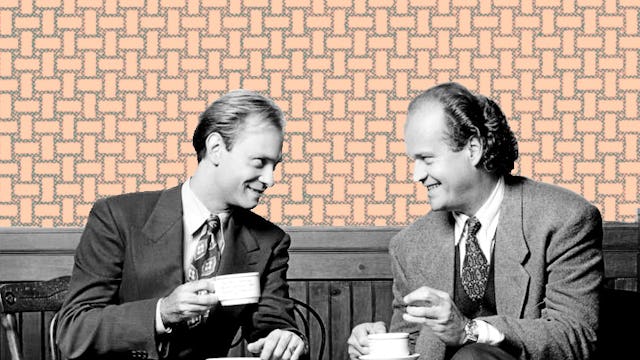Niles and Frasier Crane were just awful. And Frasier’s upwardly-mobile audience wanted to be just like them


‘Frasier’ was never about making fun of the rich
In the series finale of Frasier, which aired on May 13, 2004, Niles Crane is seemingly nervous about whether his unborn child will turn out more like him, cultured and sophisticated, or like his wife Daphne’s family of layabouts and criminals. He resorts to buying Daphne a speaker to play classical music for the baby (Vivaldi, specifically). As soon as he places the speaker on her stomach, the baby wildly kicks it off. Niles looks devastated. Perhaps it’s already too late to ensure his unborn child’s level of taste.
During the pandemic, I watched all 11 seasons of Frasier for the first time. Just as many stuck at home turned to comforting television to pass the time, I dove into the sitcom that was heaped with acclaim for its skewering of wealth, taste, whiteness, and highbrow culture. It was always part of the show’s charm that the lowest-brow form of entertainment — the network situational comedy — was taking the bourgeoisie to task.
As I took all this in during a public health crisis and the Black Lives Matter movement through the summer of 2020 and beyond, I was struck by how the show’s soft touch on class and money, fell flat in 2021. (The less said about the upcoming reboot, the better.)
Unlike recent satires of wealth and status, like HBO’s The White Lotus or Succession, which strike a darker tone and judge their characters far more harshly, Frasier was never interested in actually critiquing power structures, or making its audience actively uncomfortable. This largely has to do with genre expectations, as a mainstream sitcom is intended to entertain and attract a wide swath of advertisers. But it also reflects a period — the mid-1990s into the 2000s —when there was nothing more desirable than to be nouveau riche. If anything, the show was aimed at the same demographic as Niles and Frasier Crane, both trained psychiatrists, able to chuckle at their own snobbery through recognition of it in themselves.
In contrast, The White Lotus is steeped in utter cynicism, aiming to discomfit the audience from a similar perspective but with far more bite. (The show’s creator, Mike White, has spoken about his identification with the world and its characters.) The hotel guests of the White Lotus are unequivocally bad people who do bad things — we should not admire them in any way.
Frasier, by design, courted the white upper-middle-class, knowing they would laugh along. The show lampoons Frasier and Niles and exaggerates their preoccupations and material obsessions — every glass of sherry they pour, every ticket to the opera, every prized African statue, and every reference to Freud, Alfred Lord Tennyson, Chaucer, Dante, and so on. The educated elite poke at themselves out of an assurance that the traditional ladder to power and status still existed, and that each and every luxury accouterment and social gathering was a further step ever-upward.
Frasier was never interested in critiquing power structures or making its audience actively uncomfortable.
It is undeniably fun to watch Frasier bumble his way through acquiring and flaunting these signifiers, because that striving in itself is desperate, and humor is often birthed within desperation and humiliation. The old and decaying chair of Frasier and Niles’ ex-cop father, Martin, sits smack dab in the middle of Frasier’s spotless living room. It’s is an ongoing issue for Frasier because it represents the one thing in his home that betrays his supposed blue-collar origins — putting aside what must’ve been a fairly sizable salary and pension for Martin as a Seattle police officer — a hint to esteemed visitors that Frasier’s privilege is all performance.
In season seven, Frasier and Niles compete to become the next “corkmaster” of their wine club, because they can think of no higher honor—or rather, no higher social signifier—despite its triviality and meaninglessness. In season six, they compete at a silent auction for a lunch with three Nobel Prize winners, ultimately spending $8,000 on the meal, during which they embarrass themselves. In season five, the brothers compete to get Martin the best birthday present, and all they can come up with are massively expensive items without any emotional potency (Niles finds a way to bridge the gap by acquiring Martin’s old police horse). This competitive spirit is typical of siblings, but it also neatly parallels the socioeconomic competitive rat race of the upwardly-mobile. Perhaps unsurprisingly, then, much of the show’s best and most memorable humor is in these episodes and sequences, picking at the fruitless nature of their pursuits while playing into their deeply-seated character traits. It’s just good comedy.
Some of Frasier’s contemporaries often had a sharper sword when it came to this kind of satire, like the utter inanity of the Bluth family and its fortune in the first three seasons of Arrested Development. Even The Office, which remains a cultural juggernaut that streaming companies barter hundreds of millions over for rights, would find ways to draw out the parameters of class, race, and gender that defined character relationships to status, digging into root causes of their relative position in society. What The Office and Frasier have in common is a comforting vibe, a stability and dependability, a knowing awareness of how easy it is to make fun of these people and how that makes them worth watching and letting regularly into our lives.
Personally, I find it much easier to find sympathy for and enjoy the presence of Niles, in part because of David Hyde Pierce’s incredibly pitched performance, and also because he is generally less contemptible and pathetic than his brother. Frasier, on the other hand, is routinely embarrassing, belittling, and just plain unpleasant, which made it easier for me to find a harshness to the show’s satire that may not actually be fully present. My disdain for the character may outweigh the show’s own.
Still, I came to look forward to their appearance in my days, and gradually I came to understand it as a comfort that, aside from its jokes, characters, and sitcom pleasures, ultimately signaled to me the end of an era that is best left in the past. Any Frasier reboot faces an uphill battle for 2021 audiences precisely because that ladder of stability has been rightly pulled out from under them. Watching the original series under these conditions is often so amusing due to this anachronism.
Of course, this isn’t to say that the financial structures Frasier depended on have disappeared (far from it) or that this satirization of privilege and social climbing is now untenable. Instead, it means that Frasier is best left in the early 2000s, because that way I can continue to insert and project any harshness I want onto the show that existed then, finding contentment in Frasier’s obscene boorish behavior as a wannabe-elite and finding true enjoyment in Martin’s irritation over his sons’ snootiness, or in Daphne’s brutal comebacks, or in Roz’s down-to-earth and liberated lifestyle, which is the one I find legitimately aspirational. Frasier is dead; long live Roz.